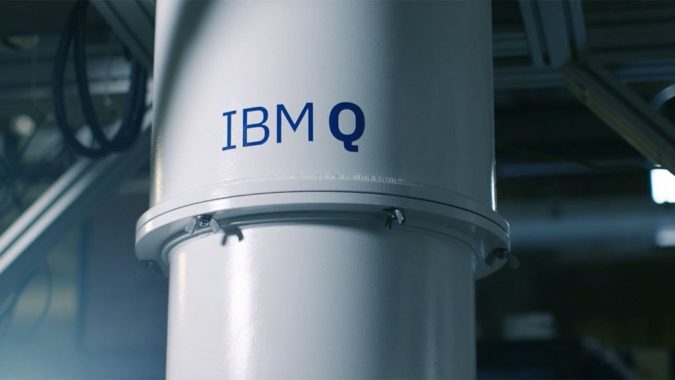IBM Research is pairing its Jupyter-based Data Science Experience notebook environment with its cloud-based quantum computer, IBM Q, in hopes of encouraging a new class of entrepreneurial user to solve intractable problems that even exceed the capabilities of the best AI systems.
Big Blue has been providing scientists, researchers, and developers with free access to IBM Q processors for over a year. The favorite way to access these quantum systems is through the Quantum Information Software developer Kit (QISKit), which is software development environment designed to allow users to develop and deploy quantum algorithms via a Python interface.
In a blog post today, IBM announced that it has issued more than 20 new QISKit notebooks this week, and the bulk of them are targeted at quantum researchers to perform various types of experiments. But among the new notebooks is one designed to help developers conduct quantum experiments through the Data Science Experience (DSX), which is IBM’s cloud-based data science notebook offering that’s targeted at commercial data scientists.
The hope is that the new DSX offering could open the door to a new class of developer, specifically “entrepreneurial-minded programmers and developers” who are eager to experiment with quantum computing’s potential, but who aren’t necessarily interested in quantum computing for quantum computing’s sake.
Jay M. Gambetta, who’s a manager for Theory of Quantum Computing and Innovation at IBM, say the new DSX option is an excellent choice for a developer who’s just getting started with QISkit.
“You can skip all the installation and environment creation steps on your computer, and instead use this Web-hosted Jupyter notebook environment for running the Quantum programs,” Gambetta tells Datanami (HPCwire‘s sister pub) via email. “It also provides a platform where you can invite fellow researchers to collaborate on the notebooks you have developed or simply share your work within the community.”
While DSX helps data scientists script and solve big data problems using the latest machine learning (it includes Apache Spark MLlib and IBM’s own SystemML libraries), the capability to add quantum computing to the mix gives the environment something not readily available elsewhere.
It also gives data scientists the potential to solve intractable problems that even exceed the capabilities of today’s mammoth distributed clusters. For example, an IBM spokesperson says a quantum computer could yield the solution to the traveling salesman’s problem. “A new Jupyter notebook gives developers the chance to explore this age-old problem,” the spokesperson says.

Gambetta says it’s still an open research problem which applications have the potential to benefit from approximate quantum computing. “With quantum programing so new there is much to be learnt and implemented,” he says. “But for now we are starting with putting a few examples on DSX.”
IBM delivered public access to a quantum computer two years ago as an enablement tool for scientific research. In March of this year, it launched IBM Q on its cloud with an eye toward allowing both scientists and business users to experiment with the novel processing approach.
Quantum computers are designed to simultaneously store and calculate bits data in multiple states, what’s called “entanglement,” as opposed to the on or off of today’s binary systems. The hope is that the quantum approach opens computational powers that exceed the capability of today’s “classic” approach.
On its website, IBM compares the current state-of-the-art in artificial intelligence with one possible quantum future:
“While technologies like AI can find patterns buried in vast amounts of existing data, quantum computers will deliver solutions to important problems where patterns cannot be found and the number of possibilities that you need to explore to get to the answer are too enormous ever to be processed by classical computers.”
IBM today offers public access to two quantum computers on its Bluemix cloud under the IBM Q banner, including the original 5 qubit processor, and a beta 16 qubit processor that’s available upon request. IBM has also built a 17 qubit prototype processor for its commercial quantum system.
The new Jupyter notebooks in QISKit bring quantum computers to bear on a range of specific scientific problems, including:
- Running tomography and decoherence experiments for studying the state of the quantum system;
- New tools for visualizing quantum states;
- A notebook that demonstrates how to calculate the equilibrium bond lengths in Hydrogen (H2), and Lithium hydride (LiH);
- And a new notebook that showcases MaxCut problems, defined by finding the minimum (cost of something), and the maximum (the profit of that something), as well as the Traveling Salesman challenge of the “perfect route.”
“Whether you’re a quantum research scientist, trying to study the fundamentals of quantum states, a developer who wants to understand how you’d actually solve problems in chemistry or optimization, or someone who is curious how to build quantum games, you’re gonna love what we just put out,” writes Talia Gershon, a research staff member at the Thomas J. Watson Research Center in Yorktown Heights, New York.
Editor’s note: This story was corrected. IBM’s 17 qubit quantum processor is not available to the public. We regret the error.


























































